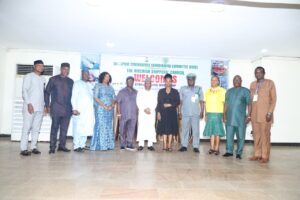
Joyce Veronica Mmereole
In a call for significant reform, the Federal Government of Nigeria has urged a collaborative effort to establish a regulatory framework aimed at empowering exporters, streamlining processes, and unlocking the full potential of the nation’s commodity export sector.
Speaking at a one-day stakeholders workshop organized by the Federal Ministry of Industry, Trade, and Investment in collaboration with the Nigeria Shippers Council, the Permanent Secretary of the Federal Ministry of Industry, Trade, and Investment, Amb. Nura Rimi, emphasized the crucial role of Nigerian ports in boosting export efficiency and competitiveness.
Represented by the Director of the Commodities and Export Department, Kaura Irimiya, Rimi highlighted Nigeria’s vast wealth of exportable commodities, ranging from oil and gas to agricultural produce.
“Our ability to efficiently export these commodities is crucial for our economic growth and international competitiveness,” Rimi stated, stressing that optimal port operations are vital for smooth export flows.
The workshop, themed “Port Economic Regulation and Its Impact on Shipment of Export Commodities through Nigerian Ports,” was organized with significant input from the Export Commodities Coordinating Committee (ECCC). Established in 1988, the ECCC was formed in response to challenges from the Structural Adjustment Programme (SAP), which led to the privatization of state-owned industries and the abolition of commodity marketing boards. The committee has been pivotal in ensuring that only commodities meeting international standards are exported from Nigeria.
Rimi reiterated the importance of the workshop in gathering stakeholders to examine the impact of port economic regulation on non-oil export commodities. He called for a united effort to create a regulatory framework that empowers exporters and streamlines export processes.
“Let us use this platform to brainstorm solutions, share best practices, and create a roadmap for a more efficient and competitive commodity export in Nigeria,” he urged.
Pius Akutah, Executive Secretary/CEO of the Nigerian Shippers Council (NSC), highlighted the council’s efforts in cost moderation, setting operational standards, and mediating disputes to ensure harmony in the port sector.
He pointed out high transport costs associated with Nigeria’s agricultural exports, attributing these to inefficient port operations, high cargo handling charges, inadequate infrastructure, and port congestion.
“The high cost of cargo movement can be attributed to various factors including inefficient port operations, high cargo handling charges, inadequate transportation and storage infrastructure, long delays and congestion at the ports, high fuel costs, and inadequate competition in the transport sector,” Akutah explained.
Mr. Glory Onojedo, Director of Consumer Affairs at the NSC, echoed these concerns and emphasized the need to address challenges related to port access and high cargo handling costs.
He noted that the workshop aimed to identify practical solutions to make Nigerian ports more accessible, cost-efficient, and operationally effective.
In his goodwill message, the President of the Shippers Association of Lagos (SAL), Mr. Leo Ogamba, expressed optimism that the workshop would lead to improved communication and collaboration among regulators, port operators, shippers, and exporters.

